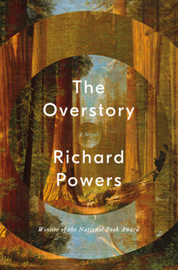The Overstory by Richard Powers

“The Overstory is a sweeping, impassioned work of activism and resistance that is also a stunning evocation of – and paean to – the natural world. From the roots to the crown and back to the seeds, Richard Powers’s twelfth novel unfolds in concentric rings of interlocking fables that range from antebellum New York to the late twentieth-century Timber Wars of the Pacific Northwest and beyond.”
There are countless reviews out about The Overstory. They use words such as “life-changing”, “ambitious”, and “beautiful”, all of which I agree with whole-heartedly. However, when sifting through reviews, I couldn’t help but notice that Powers’ use of gender in The Overstory is often criticized. Given that the majority of the protagonists in this awe-inspiring novel are male, with even trees claiming the “he/his” pronoun, I can understand this criticism. Still, it occurred to me that perhaps this overuse of the masculine was intentional. In life and literature, women and femininity are bound to compassion, softness and nurturing ad nauseum. Yet, in this book, most of the men share those same qualities. If it is this book’s purpose to light a match to the collective human subconscious, then Powers’ focus on men who are compassionate, soft and nurturing makes sense. If The Overstory means to enlighten all of us and motivate us towards saving our natural world, then it must show that the ability to do so must come from all of us, regardless of gender.
Brief gender discussion aside, I loved this book. It taught me so much about so many trees, birthing a new desire to learn more and explore more amongst the giants that we owe so much of our lives to. I highly recommend this book to all humans, young, old and in between.
Quotes:
“Men and trees are closer cousins than you think. We’re two things hatched from the same seed, heading off in opposite directions, using each other in a shared place. That place needs all its parts.”
“You and the tree in your backyard come from a common ancestor. A billion and a half years ago, the two of you parted ways. But even now, after an immense journey in separate directions, that tree and you still share a quarter of your genes…”
From Richard Powers:
“Whatever I present in the book as scientific fact was, to the best of my ability at the time of publication, verifiable, consensually repeated and agreed upon.”
- Now, widely accepted “in some quarters that up to one percent of our genome could have originated in plants by way of horizontal genetic transfer.”
Why I chose this, and what it means to me:
- Connection to the earth
- Connection to each other
- Healing power of trees
- Recognizing these things enhances our capacity for empathy and our openness to vulnerability; therefore, increasing our passion and love for the places we live and ultimately, our desire to respect and protect those places.